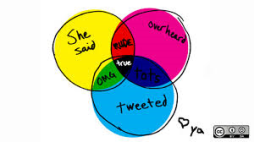There has been a lot of debate on social media recently about journalists who report a correlational scientific studies as showing causation (particularly with regard to social media/technology and children’s well-being) potentially worsening the panic and worry felt by parents, teachers and others working with children.

Not sure why a correlational study does not provide evidence of causation?
TEDEd is a great place to learn something new and have your thinking challenged. David H. Schwartz will help you to dissect two types of scientific studies and in the process, will illuminate why everyone should always look at scientific claims with a critical eye. These activities are great for psychology students, parents, teachers, and anyone else who might read the newspaper and wonder why people, sometimes blindly, accept the claims made by journalists when they cite a scientific study.
Only got five minutes? Watch the video and share with your friends & family.
Got 15 minutes? Have a go at this QUIZ to think deeper about what the video showed you.
Really interested in this topic? Check out these additional resources
